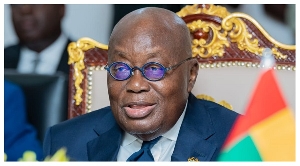- Home - News
- TWI News | TV
- Polls
- Year In Review
- News Archive
- Crime & Punishment
- Politics
- Regional
- Editorial
- Health
- Ghanaians Abroad
- Tabloid
- Africa
- Religion
- Election 2020
- Coronavirus
- News Videos | TV
- Photo Archives
- News Headlines
- Press Release
General News of Saturday, 10 February 2001
Source: GNA
Ghana Post to reintroduce savings
 The Ghana Post Company (GP) said on Friday it will soon start operating its savings scheme for members of the public who cannot meet the commercial banking requirements.
The Ghana Post Company (GP) said on Friday it will soon start operating its savings scheme for members of the public who cannot meet the commercial banking requirements.
"The office is still waiting for a license from the Bank of Ghana to enable it start the scheme, Mr Marcellus Duncan-Chanayire, Chief Manager of Financial Services, said in Accra.
In an interview with the GNA, Mr Duncan-Chanayire said the exercise will help mop up the over one trillion cedis in circulation outside the banking system.
Mr Duncan-Chanayire said GP is in alliance with the Metropolitan and Allied bank to operate the 'Metropost' Certificate of deposit to help the bank have access to customers outside Accra.
"Metropolitan and Allied bank has only one branch in Accra, so we are making available 56 post offices to help them reach more customers outside Accra and also to make GP easily accessible for banking services," Mr Duncan-Chanayire said.
He said one of the reasons why there is so much liquidity in the system is because most people cannot afford the deposit requirement of the commercial banks, which ranges from 100,000 cedis to 500,000 cedis for current and savings accounts.
He said the GP intends to accept savings deposit as low as 10,000 cedis to help people like hawkers, students and all those who are not in active business to start savings.
Asked if the scheme will not conflict with the one launched in conjunction with the Metropolitan and Allied Bank, Mr Duncan-Chanayire said the Metropost certificate is in the form of a 91 day fix term deposit while the GPs will be purely bank savings.
"Whilst waiting for our license, we need to make money, and business must also go on," he said. "The current alliance is also a learning stage for us at GP to be ready to commence immediately we have our license."
During the last World Post day, Ghana Post stated its intention to reintroduce the scheme, which was stopped in the early 80's.










